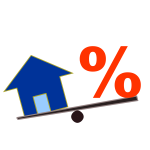The Federal Reserve is likely to discuss making its biggest interest rate increase since 1994 at its meeting this week, as a range of new data suggest that inflation is coming in hotter and proving more stubborn than policymakers had hoped. Will inflation affect your home loans?

Central bankers have been promising to be nimble as they fight inflation — a stance that will probably prompt them to at least discuss whether to raise interest rates by three-quarters of a percentage point on Wednesday, when officials are set to release both their decision and a fresh set of economic projections.
The Fed raised rates by half a percentage point in May and officials had suggested for weeks that a similar increase would be warranted at their meetings in June and July if data evolved as expected.
Two separate measures of inflation expectations, one out last week and another released Monday, showed that consumers were beginning to anticipate notably faster price increases. Powell, the Fed chair, and other officials have repeatedly stressed the need to bring prices back down to a stable level to ensure a healthy economy.
The string of worrying news has caused economists and investors alike to bet that the central bank will make its biggest interest rate increase since 1994 to signal that it recognises the problem and is making fighting inflation a priority.
Wall Street is bracing for interest rates to rise more than investors had anticipated just days ago, a reality that is sending stocks plummeting and causing other markets to bleed, including that for cryptocurrencies. Investors now expect rates to climb to a range of 2.75 to 3 percent as of the Fed’s September gathering from their current range of 0.75 to 1 percent..
For those expectations to materialise, central bankers would need to make two three-quarter-point moves over the course of its next three meetings. When the Fed lifts its policy interest rate, it filters through the economy to make borrowing of all kinds — including mortgage debt and business loans — more expensive. But interest rates are a blunt tool, making it difficult for the Fed to slow the economy with precision.
Households, economists and investors increasingly fear that the biggest interest rate increase will set off a recession.
Anxiety about a coming downturn ricocheted through markets on Monday. This came as median mortgage rates doubled over the last six months as the global effort by central banks to combat inflation through higher interest rates takes a toll on local home-buyers.
SORA will rise in tandem with the biggest interest rate increase
Our domestic benchmark interest rate – the Singapore Overnight Rate Average (SORA) – is set to hike up in tandem with US rates. But for now, mortgage interest rates are still competitively hovering around 1.65 – 2.35 per cent, but they will continue to go on the up and up throughout 2022.
Mr Paul Ho chief officer at iCompareLoan said, “how the FED interest rate hike works is by making loans more expensive and technically, should lead to reduced spending.”
“The move will put pressure on Singapore’s financial institutions to raise interest rates as well,” he added.
As most home loan rates are now pegged to SORA, you will not see interest rates prematurely rising too out of step with the US Fed Funds Rate. This is because although SORA is a “backward”-looking interest rate mechanism which reacts to interest rate movements in Singapore, changes to the US Fed Funds Rate has global repercussions, so SORA is expected to react accordingly.
The biggest interest rate hike in the US will definitely dent some of the enthusiasm in the buoyant property market, and could pose a big problem for homeowners who are still servicing their mortgage loans. This is because banks and financial institutions calculate lending rates by adding a margin (which covers their costs and their profit) to a published financial index, like SORA.
If you want to refinance your mortgage loan and are curious about low mortgage interest rate environment, you must be wondering about how SORA works.
SORA basically uses a volume-weighted approach where the average rate of all actual transactions traded and booked in the unsecured overnight interbank SGD cash market in Singapore between 8 am and 6:15 pm. The phrase “volume-weighted” simply means that the calculations consider the actual amount being lent.
Which means that a 3M compounded SORA rate is based on a compounding period of 3 months of the historical SORA rate which is published daily on the MAS website and a 1M compounded SORA rate is based on a compounding period of 1 month of the historical SORA rate which is published daily on the MAS website.
Mr Ho said, “All these terms, 3M, 1M, fixed rate, floating rate, etc can be confusing to some home owners who want to refinance. And also there may only be a short window of opportunity open if you want to refinance your mortgage loan.”
He added, “So, anyone who wants the best home loan should speak to mortgage consultants as they can get the best rates for home owners who want to refinance their home loans by comparing across 16 banks and financial institutions. The have the latest home loan info to guide home owners to make the right decision and best of all, their services are free.”
Savvy home loan borrowers will know how to navigate away from biggest interest rate increase
What does this news mean for homeowners in Singapore? Well, it marks a closing window of time to refinance our properties and get the most savings out of our monthly repayments.
During a low-interest rate climate, savvy borrowers may prefer to capitalise on low interest payments by taking a market-pegged interest rate variable package. But when these borrowers are (like now) hit by the biggest interest rate hike, they may try to change the loan to a fixed rate package for some years so as to be able to lock in lower rates and better manage their cash flow.
Fixed rate packages are usually more expensive, but provide the most stability as rates are kept fixed for up to the first 3 to 5 years of the loan tenure. There is no perpetual fixed rate being offered by banks in Singapore at the current moment. This is where a refinancing guide can be useful to home owners to read-up on remortgage and be knowledgeable about the entire process.
Positive side of interest rate environment
Today, consumers have a wide range of home loan packages to choose from compared to several years ago, and this is a huge advantage to home buyers and investors.
Home loans could also be tied up with other programmes which rewards customers with a higher interest rate on their deposits if they transact more with the bank, such as getting a home loan and crediting their salary with the same bank.
Typically, with mortgage loans you are offered attractive rates for the first three years when you refinance – following which the interest rates are adjusted upwards. This usually coincides with the end of the lock in period, offering borrowers a good opportunity to relook their loans.
Those who already have a home loan with a lender you are comfortable with, should consider repricing, especially as we get near the biggest interest rate increase environment.
Repricing refers to switching to a new home loan package within the same bank while refinancing refers to closing your current home loan account and setting up a new home loan account with another bank.
A repricing typically occurs when new incremental loan facilities and/or refinancing facilities are introduced into the same documentation as an existing loan. The proceeds from the new incremental loan facility will have a lower margin and will be used to repay the existing loan.
While repricing lets you replace your existing loan with a new loan with the same lender that potentially has a new interest rate or revised repayment timeline, refinancing might be a good option if interest rates have dropped or are lower than your current rate, or if you need to extend your repayment term.
When considering refinancing versus repricing, remember that securing a lower interest rate will reduce your cost of borrowing so you’ll pay less on your home loan, overall.






